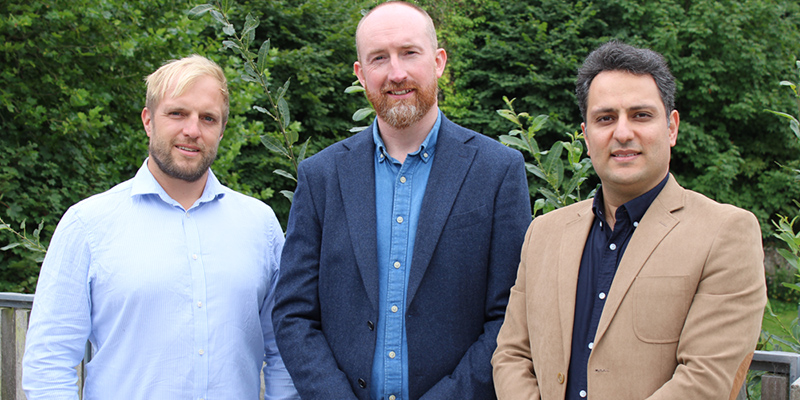UCC researchers receive €1.2m to develop climate services and risk-based climate adaptation tools

Researchers at University College Cork (UCC) have received €1.2 million in research funding under Met Éireann’s Weather and Climate Research Programme to develop innovative research projects aimed at addressing climate change, extreme weather events and environmental sustainability.
The three UCC research projects awarded under this third iteration of the ‘TRANSLATE’ climate services flagship programme will continue the aims of this Met Éireann led initiative to optimise standardised climate projections for Ireland and develop climate services. The projects will expand the knowledge and understanding of climate change impacts into the annual to decadal timeframe. They will explore the nature of how extreme events are changing and will develop services that support adaptation and decision-making for greater climate resilience in Ireland.
The aim of Met Éireann’s Weather and Climate Research Programme is to maximise the impact of research in service of society through targeted research calls, strategic growth of internal expertise and strong partnerships with other research funding organisations. Met Éireann’s Research Call 2024, with a total funding amount of €2.8m, is the second largest award under Met Éireann’s Research Call Scheme. Through its Research Call Scheme, Met Éireann has so far funded €10.8m worth of research projects in Irish academic institutions. This includes €1.4m of funding received for the previous TRANSLATE 1 and TRANSLATE 2 projects, successfully delivered by UCC and ICHEC, with UCC activities led by PI Dr Paraic Ryan, and Co-PI Dr Paul Holloway.
Commending the recent awardees, Eoin Moran, Director of Met Éireann, commented: "These research projects represent critical contributions to both national and international efforts to address climate change, extreme weather, and environmental sustainability. As a proud supporter of innovative research, Met Éireann is committed to ongoing exploration that supports adaptive responses and strategic planning for improved climate resilience."
The six national projects starting under Met Éireann’s Weather and Climate Research Programme 2024 represent the largest number of awards made by Met Éireann in one competitive research call. Researchers at UCC will lead half of these projects:
Dr Paraic Ryan & Dr Jenny Harmon O’Driscoll, School of Engineering & Architecture (Department of Civil Engineering)
Project Title: Building Resilience and Adaptation Capacity for future extreme Events (BRACE)
Funding Amount: €599,981
The BRACE project will address gaps in knowledge around uncertainties and vulnerabilities, translating complex climate data into practical applications for infrastructure planning and policymaking. Through case studies on events like Storm Ophelia and collaboration with stakeholders such as Transport Infrastructure Ireland, BRACE will assess compound and cascading risks, informing national adaptation strategies. BRACE will integrate interdisciplinary expertise to deliver advanced projections, impact analyses, and risk models, supporting risk-based decision-making and reinforcing Ireland’s leadership in climate adaptation.
"This work will focus on increasing the resilience of Ireland’s infrastructure and sectors to climate change through the provision of risk-based decision support. The multi-disciplinary team, led by Jenny Harmon O’Driscoll and I, will continue to work closely with industry partners and stakeholders to ensure the project findings inform policy and bring about meaningful climate adaptation action for Ireland," said Dr Ryan.
---------------------------------------------
Dr Paul Holloway & Dr Rosa Rogers, School of Human Environment (Department of Geography) & School of English and Digital Humanities
Project Title: Climate Services for Multi-sector Benefits (CLIMB)
Funding Amount: €299,392
Ambitious climate services that take a standardised and societal approach are urgently needed. The CLIMB project will utilise machine learning to develop a standardised approach for harmonising sector-specific and cross-sector exposure and vulnerability geospatial data alongside future climate projections. Moreover, climate change communication has often relied on expository messages and scientific reports, though these fall short in engaging all members of society, meaning there persists a need to identify, develop, and quantify the impact of science communication to enable future cross-sectoral climate services. Through CLIMB, the project team will design an accessible Virtual Reality (VR) and narrative-based storyline communication strategy and assess the impact of these stories.
"Using state-of-the-art geospatially informed machine learning, we will develop a standardised approach for harmonising sector-specific and cross-sector climate and non-climate data to improve resilience, reduce vulnerability, and foster more sustainable practices, ultimately leading to a more climate-resilient future," said Dr Holloway.
---------------------------------------------
Dr Vahid Aryanpur, Sustainability Institute
Project Title: Climate-Informed Energy Systems Planning to Support Ireland’s Net Zero Ambitions (ClimEnergise)
Funding Amount: €299,546
The ClimEnergise project will address the growing vulnerability of Ireland’s energy sector to climate variability, particularly in the context of electrification and reliance on weather-dependent renewables. By integrating detailed meteorological data with advanced energy systems modelling, ClimEnergise will translate weather fluctuations and extreme events into actionable strategies that enhance energy security, affordability, and resilience. The project will evaluate the impacts of both single and compound climate risks - such as extended low wind during cold spells - on energy supply and demand across sectors, identifying cost-effective, robust decarbonisation pathways aligned with Ireland’s 2050 climate neutrality goals.
"The project integrates high-resolution climate data with national energy system models to assess how short-term weather fluctuations, long-term climate patterns, and extreme events impact energy supply, demand, costs, and security. By linking climate science with energy modelling, the project helps identify cost-effective, resilient strategies to manage climate risks and ensure a secure, low-carbon energy future for Ireland," said Dr Aryanpur.
Professor John Cryan, Vice President for Research and Innovation at University College Cork said: "We are immensely proud of our researchers at UCC who will lead half of the research projects announced today by Met Éireann, and we are grateful to Met Éireann for their continued support in funding research that is critical to finding innovative solutions to better prepare and protect people in the event of extreme weather and climate related events. These awards will further strengthen UCC’s global leadership in sustainability research and deliver significant positive societal impact while also addressing key environmental challenges."
UCC Research
Aistriú Taighde
Contact us
Office of Vice President for Research & Innovation, 4th Floor, Block E, Food Science Building University College Cork, T12 K8AF
